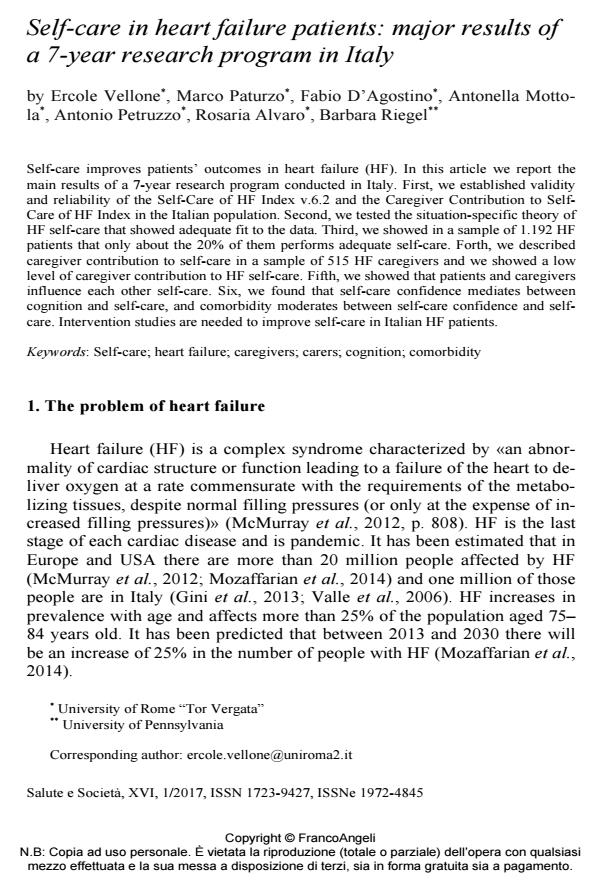Self-care in heart failure patients: major results of a 7-year research program in Italy
Titolo Rivista SALUTE E SOCIETÀ
Autori/Curatori Ercole Vellone, Marco Paturzo, Fabio D’Agostino, Antonella Mottola, Antonio Petruzzo, Rosaria Alvaro, Barbara Riegel
Anno di pubblicazione 2017 Fascicolo 2017/1
Lingua Inglese Numero pagine 14 P. 51-64 Dimensione file 703 KB
DOI 10.3280/SES2017-001005
Il DOI è il codice a barre della proprietà intellettuale: per saperne di più
clicca qui
Qui sotto puoi vedere in anteprima la prima pagina di questo articolo.
Se questo articolo ti interessa, lo puoi acquistare (e scaricare in formato pdf) seguendo le facili indicazioni per acquistare il download credit. Acquista Download Credits per scaricare questo Articolo in formato PDF

FrancoAngeli è membro della Publishers International Linking Association, Inc (PILA), associazione indipendente e non profit per facilitare (attraverso i servizi tecnologici implementati da CrossRef.org) l’accesso degli studiosi ai contenuti digitali nelle pubblicazioni professionali e scientifiche.
Self-care improves patients’ outcomes in heart failure (HF). In this article we report the main results of a 7-year research program conducted in Italy. First, we established validity and reliability of the Self-Care of HF Index v.6.2 and the Caregiver Contribution to Self-Care of HF Index in the Italian population. Second, we tested the situation-specific theory of HF self-care that showed adequate fit to the data. Third, we showed in a sample of 1.192 HF patients that only about the 20% of them performs adequate self-care. Forth, we described caregiver contribution to self-care in a sample of 515 HF caregivers and we showed a low level of caregiver contribution to HF self-care. Fifth, we showed that patients and caregivers influence each other self-care. Six, we found that self-care confidence mediates between cognition and self-care, and comorbidity moderates between self-care confidence and self-care. Intervention studies are needed to improve self-care in Italian HF patients.
Parole chiave:Self-care; heart failure; caregivers; carers; cognition; comorbidity
- A longitudinal assessment of chronic care pathways in real-life: self-care and outcomes of chronic heart failure patients in Tuscany E. Guidotti, F. Pennucci, A. Valleggi, S. De Rosis, C. Passino, in BMC Health Services Research 1146/2022
DOI: 10.1186/s12913-022-08522-0
Ercole Vellone, Marco Paturzo, Fabio D’Agostino, Antonella Mottola, Antonio Petruzzo, Rosaria Alvaro, Barbara Riegel, Self-care in heart failure patients: major results of a 7-year research program in Italy in "SALUTE E SOCIETÀ" 1/2017, pp 51-64, DOI: 10.3280/SES2017-001005